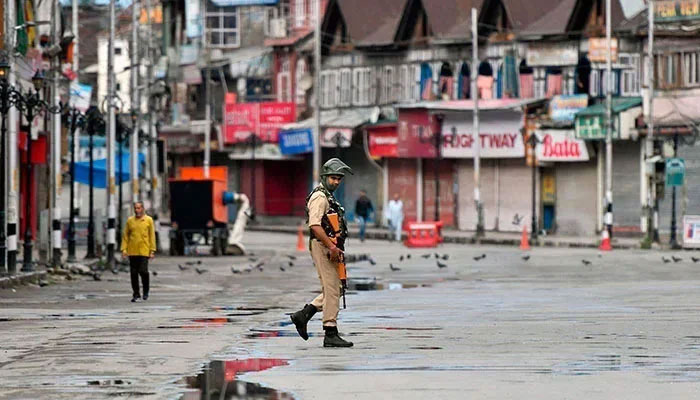A tale of two terrors
This may be highest soldier-to-population proportion in any region in world
There are two types of terrorism in Indian-Occupied Kashmir. By far, the greater terror is that of the Indian occupying army. There are half a million soldiers in Kashmir oppressing and terrorising a population of eight million people – one Indian soldier for every 16 Kashmiris. This may be the highest soldier-to-population proportion in any region in the world.
The lesser terror is that of the handful of Kashmiri resistance fighters. This resistance has been begat by the greater terror. Were there no greater terror, there would be no lesser terror.
India’s desperate attempts to characterise the Kashmiri resistance as adventitious are spurious. It is intended to distract attention from the brutal suppression the Kashmiri people have suffered at India’s hands for the better part of 80 years.
This Kashmiri resistance is a purely indigenous movement. Of course, not all their actions are defensible: the taking of innocent life is to be condemned no matter who the perpetrator – India's army of occupation or the Kashmiri resistance.
But it is Indian Prime Minister Narendra Modi who, by rewriting India's constitution, has stoked the resistance in Kashmir. He alone is responsible for the loss of all innocent life and all terror in Kashmir.
Now that he has been wounded and deeply embarrassed by Pakistan’s Operation Bunyanum Marsoos, he would be wise to pull his forces out of Occupied Jammu and Kashmir and allow the people of those benighted territories to exercise their right of self-determination as required by the UNCIP resolution of 1949 – a resolution to which India was a party.
Following India’s unambiguous slap down by Pakistan in the military domain, Indian policy seems to have returned to its customary skullduggery: Exploiting perceived schisms in Pakistan. The Indian media, after the slap down, is flooded with talk of separatist movements in Balochistan and Khyber Pakhtunkhwa.
But Sri Modi would do well to worry more about his own backyard: The facade of Indian invincibility and power has crashed to the ground. Indigenous separatist movements such as those in Jammu and Kashmir, Punjab, the northeastern states such as Mizoram and Nagaland, the Red Corridor States such as Chhattisgarh and Telangana have been emboldened. They now realise that what they thought to be a tiger is really a toothless lion.
Sadly, Sri Modi remains a real and present danger not so much to Pakistan, but rather to the Indian nation, its integrity, solidarity and sovereignty. His extremist Hindutva beliefs have shattered the golden principles of secularism and equal rights for all on which the Indian state was founded.
Pakistan’s military defeat of India is likely to have political implications in both countries. In India, Sri Modi’s image and stature have been severely damaged. He has gratuitously embarrassed the Indian people as no Indian leader in history has ever done before. His days in the political limelight may be nearing an end.
In Pakistan, the image of the military establishment has been hugely burnished by its success in embarrassing India. An image tarnished of late at the hands of the supporters of the ameerul momineen currently ensconced in jail.
But the military's performance has changed all that. The ameer himself is starting to fade from memory as Pakistanis discover a new love for and pride in their military. Unknowingly and inadvertently, Sri Modi has unified Pakistanis as never before. We may yet turn out to be his worst nightmare.
The writer is the chairman of Mustaqbil Pakistan and a scholar of Arabic.
-
 Sam Levinson Donates $27K To Eric Dane Family Fund After Actor’s Death
Sam Levinson Donates $27K To Eric Dane Family Fund After Actor’s Death -
 Savannah Guthrie Mother Case: Police Block Activist Mom Group Efforts To Search For Missing Nancy Over Permission Row
Savannah Guthrie Mother Case: Police Block Activist Mom Group Efforts To Search For Missing Nancy Over Permission Row -
 Dove Cameron Calls '56 Days' Casting 'Hollywood Fever Dream'
Dove Cameron Calls '56 Days' Casting 'Hollywood Fever Dream' -
 Prince William, Kate Middleton ‘carrying Weight’ Of Reputation In Epstein Scandal
Prince William, Kate Middleton ‘carrying Weight’ Of Reputation In Epstein Scandal -
 Timothée Chalamet Compares 'Dune: Part Three' With Iconic Films 'Interstellar', 'The Dark Knight' & 'Apocalypse Now'
Timothée Chalamet Compares 'Dune: Part Three' With Iconic Films 'Interstellar', 'The Dark Knight' & 'Apocalypse Now' -
 Little Mix Star Leigh-Anne Pinnock Talks About Protecting Her Children From Social Media
Little Mix Star Leigh-Anne Pinnock Talks About Protecting Her Children From Social Media -
 Ghislaine Maxwell Is ‘fall Guy’ For Jeffrey Epstein, Claims Brother
Ghislaine Maxwell Is ‘fall Guy’ For Jeffrey Epstein, Claims Brother -
 Timothee Chalamet Rejects Fame Linked To Kardashian Reality TV World While Dating Kylie Jenner
Timothee Chalamet Rejects Fame Linked To Kardashian Reality TV World While Dating Kylie Jenner -
 Sarah Chalke Recalls Backlash To 'Roseanne' Casting
Sarah Chalke Recalls Backlash To 'Roseanne' Casting -
 Pamela Anderson, David Hasselhoff's Return To Reimagined Version Of 'Baywatch' Confirmed By Star
Pamela Anderson, David Hasselhoff's Return To Reimagined Version Of 'Baywatch' Confirmed By Star -
 Willie Colón, Salsa Legend, Dies At 75
Willie Colón, Salsa Legend, Dies At 75 -
 Prince Edward Praised After Andrew's Arrest: 'Scandal-free Brother'
Prince Edward Praised After Andrew's Arrest: 'Scandal-free Brother' -
 Shawn Levy Recalls Learning Key Comedy Tactic In 'The Pink Panther'
Shawn Levy Recalls Learning Key Comedy Tactic In 'The Pink Panther' -
 King Charles Fears More Trouble As Monarchy Faces Growing Pressure
King Charles Fears More Trouble As Monarchy Faces Growing Pressure -
 Inside Channing Tatum's Red Carpet Return After Shoulder Surgery
Inside Channing Tatum's Red Carpet Return After Shoulder Surgery -
 Ryan Coogler Brands 'When Harry Met Sally' His Most Favourite Rom Com While Discussing Love For Verstality
Ryan Coogler Brands 'When Harry Met Sally' His Most Favourite Rom Com While Discussing Love For Verstality




